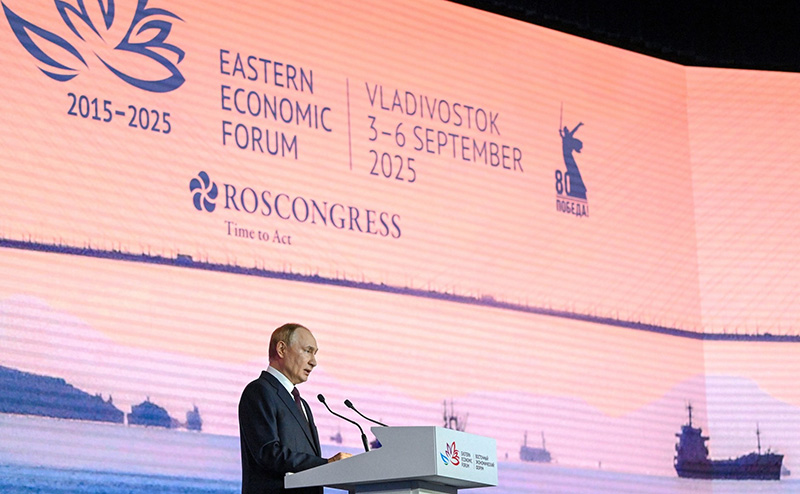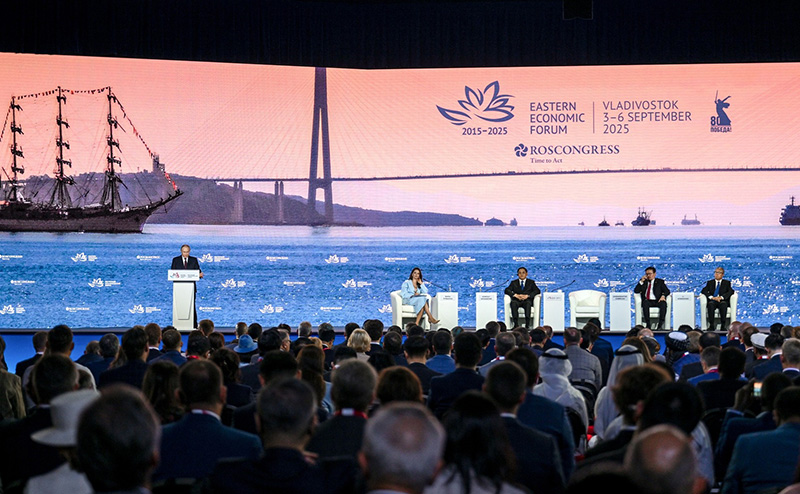 Photo: Kremlin.ru
Photo: Kremlin.ru
Russia is an open country; it neither seeks to isolate itself from anyone nor lock itself away in "a national shell;" notably, Russia’s two-headed eagle looks not only to the west and the east, but also to the south, Russian President Vladimir Putin said during the plenary session of the Eastern Economic Forum (EEF).
The president remarked that though the bear is a symbol of Russia, "the largest tiger in the world is the Siberian, Russian tiger."
TASS has gathered the key takeaways from the statements by the president.
 Photo: Kremlin.ru
Photo: Kremlin.ru
On trust
According to the Russian leader, he has repeatedly been asked who can be trusted in these difficult times, and has always given the same answer. "No one can be trusted," the president emphasized. "In order to understand a matter more deeply, you should be guided by your own experience and ask for the opinion of experts rather than the people who simply surf the Internet and share their views."
Ukraine crisis
Ukraine’s security issues cannot be resolved without taking Russia’s security into account. Security guarantees need to be developed both for Russia and Ukraine, and Moscow will respect them. If NATO troops are deployed to Ukraine – and this is "one of the underlying causes behind attempts to drag Ukraine into NATO" – Russia will see them as a legitimate target.
Speaking about the negotiation process, the president noted that not long ago, Kiev had ruled out any direct communication with Russia, but "now, we see them asking for communication or at least offering it."
Calls for his meeting with Vladimir Zelensky to be held on the platforms suggested by Kiev are excessive: "Next time, if someone really wants to meet with us, we are ready. The capital of the Russian Federation, the hero city of Moscow, is the best place for that."
"It will be almost impossible to make agreements with Ukraine on key issues: even if there is political will – although I doubt that – there still are legal and technical issues."
Under the Ukrainian constitution, any agreements on territory must be endorsed through a referendum, but "in order for a referendum to be held, martial law needs to be lifted."
"If martial law is lifted, a presidential election will have to be held right away. After, and if, a referendum takes place, a decision will be required by the constitutional court, regardless of the plebiscite’s outcome. However, the constitutional court is inactive."
Activities of Central Bank, government
The Russian Central Bank continues to combat high inflation, trying to bring it back to the target. If the key rate is drastically reduced, prices will go up. "Russia’s financial authorities, the government and the Central Bank act professionally. We have always proceeded from the fact that a stable macroeconomic policy is the basic condition for the development of the Russian economy and, consequently, the social sphere," the president said.
"Russia’s economy should become a high-wage one. This is not just an empty phrase or populism: there is economic sense in this," Putin noted. He pointed out that "Russia’s average poverty rate went down from 11.3% in 2014 to 7.2% in 2024."
Russia’s "foreign and economic policies are both stable and predictable." According to the president, this is "an objective competitive advantage because such stability is important for businesses."
Russia has certain capabilities to ensure a rise in budget revenues, and it is "not an increase in taxes," even though there is nothing terrible in the current level of budget deficit as the debt load is low, and the country has "substantial" reserves.
International relations
A bridge connecting Russia and North Korea is set to be unveiled next year, and there is confidence that direct flights will contribute to closer ties between the two countries. "I am sure that these decisions will help our countries establish even closer and stronger ties," the president said.
Russia is an open country; it neither seeks to isolate itself from anyone nor lock itself away in "a national shell." Many European companies left Russia for political reasons, facing losses, but they are now waiting for restrictions to be lifted "and would return any moment."
Putin remarked that he and US President Donald Trump had agreed on the need to call each other: "He knows that I am open to conversation. And he is too, I know that."
Meanwhile, Russia and China are working to simplify the system of mutual payments and card payments amid sanctions. China’s move to waive visas for Russian nationals was "unexpected and welcome."
Development of Far East
Russia’s Far East recorded an over 2.5-fold increase in its GDP in the past ten years, from four trillion to 11 trillion rubles ($49 billion to $135 billion), and the region is now outpacing the country’s average development rate. "In recent years, the Far East has taken the lead in terms of many key indicators, which primarily concern the economy." Gold and coal production increased 1.7-fold in the Far East in the past ten years.
The president suggested launching a single preferential regime for businesses in the Far East starting in 2027, "while maintaining the conditions for current investors."
The territories of advanced development have proved effective as this tool "helped launch multiple investment projects, and provide comprehensive support to entrepreneurs and companies at the most important phase of construction, production launches and work to reach design capacity." The single business regime in the Far East will not affect the conditions that the territories of advanced development offer.
Regional support in Far Eastern Federal District
The trend for the outflow of population, which emerged in the Far East at the end of the past century, is being gradually reversed. Apart from other support measures, additional payments for the birth of third children have yielded results. "There is an additional payment for the birth of third children in the Far East. It stands at one million rubles, compared to 450,000 rubles in the rest of the country. And that’s for a reason."
The president issued orders to expand the mortgage patterns that are in effect in the Far East and the Arctic to the secondary housing market in the areas where the construction of apartment buildings has not begun yet and where there are no offers from developers, and also to make mortgage terms acceptable "for all large families, regardless of the parents’ age."
The president also handed down instructions to expand the 2% mortgage program in the Far East to include educational workers.
Logistics development
Work will continue to upgrade the Baikal-Amur Mainline and the Trans-Siberian Railway Network and expand railroads leading to Far Eastern ports. The carrying capacity of the Baikal-Amur Mainline and the Trans-Siberian Railway Network needs to increase 1.5-fold, the president stressed.
There has been growing interest in the trans-Arctic transport corridor connecting St. Petersburg and Vladivostok. "We can see that both Russian companies active in the Arctic and foreign carriers are showing increasing interest in this route."
Rare-Earth metals
Russia has set up a system to track rare-earth metals and as technology advances, it will be possible to extract and effectively use them: "Often, these resources are piled up at deposits’ dump sites, particularly here, in the Far East. A system to track these reserves has been established. As technology advances, they may be extracted and effectively used."
The cabinet has been ordered to approve a strategy for the development of Russia’s rare-earth industry by November at the latest.
read more in our Telegram-channel https://t.me/The_International_Affairs

 13:15 05.09.2025 •
13:15 05.09.2025 •






















